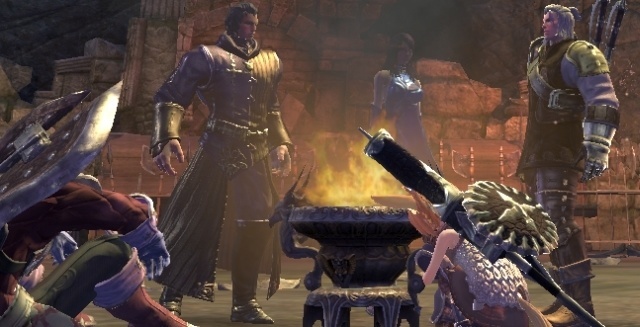Enjoy the Guild Guide column? Keep up to date with our new Twitter account @GuildGuide!
One of the biggest assets that guilds have is that they allow players to pool their resources so that everyone can benefit. This is also one of the biggest drawbacks because it raises a whole mess of additional issues.
Pooling resources is, let’s be honest, a good thing. It means that players who are unlucky with random rewards can catch up, players who have more than they need can share with others, and everyone in the guild feels as if they’re more or less on a level playing field. At the same time, it also means that you have to tacitly acknowledge at first that the players are not starting on a level playing field, and by pooling resources at times you can wind up with less of a leveling effect and more of a selfish roommate situation.
There are lots of tools available to make sure that people get fair access to items and shared resources – our sister site GamerLaunch has guild bank displays, DKP tracking, EPGP, and so on, all of the stuff you need to keep a handle on what’s being distributed and where.
But before you can get to that stage, you also make sure you have an idea about how you want distribution to happen in the first place.

The myth of perfect parity
Many of the guilds I’ve been in over time have had a simple stated goal: whatever you take out, you put in. The idea being that the guild equally benefits everyone. This isn’t just difficult, it’s outright impossible, and it defeats the entire purpose of pooling resources.
The fact of the matter is that there are always going to be some players in your guild with more time than others for whatever reason. Someone is going to be a dedicated gatherer for hours on end while another player just cannot devote that much effort to digging for fictional worms. (They might not be worms, but for this article, pretend they’re worms.) Asking the person who doesn’t have that much time to dig for worms to put something in of equivalent value every time he takes out some worms doesn’t create parity, it turns your shared resources into a store with slightly more friendly pricing.
So maybe what you mean is that you don’t feel like anyone is purely taking whilst other members are purely donating. But that also comes with problems, because there’s no effective way to track who’s putting in more than they’re taking out and vice versa. You can track DKP, certainly, but DKP doesn’t determine whether or not something useful actually drops for a specific member who has stockpiled it. If you’re the only one in your World of Warcraft guild that can use the items that drop in a run, should you be asked to pass on all of them because no one else has gotten anything yet?
There’s no perfect parity to be had. Someone is always going to be putting more in than they’re taking out, someone is always going to be primarily taking. Parity doesn’t curtail greed, it just shifts the onus to proving and feigning selflessness.

Fairness vs. equality
At the core of it, you have to ask if you want your guild’s shared resources to be fair or equal. Which is an important concept. Fair distribution means that everyone gets the same number of worms from the shared worm bank, no matter what. Equal means that worms are distributed among those who need and are using the worms.
Again, it’s probably not actually worms.
You might notice that the fair system kind of blows for the guy who gathers two hundred worms every week and gets a small fraction of them back, but it’s great for the person who gathers no worms. But, if that’s what you’re going for, the guy who’s digging up those worms is essentially forfeiting his ability to do other things with the expectation that he’ll get the same distribution for other resources. So he gets fewer worms, but he gets lots of weevils and he doesn’t have to think about gathering those as well.
In practice, fairness works out great in small groups with very narrow focuses. A progression team in an MMO, for example, can easily work out a fair system so that everyone is providing roughly equivalent resources to everyone else in the group, because you’re all working toward the same goal. In larger and more diverse groups, you find too much redundancy for that to work in the long run, often winding up with several people gathering weevils and doing minimal work while the worm guy is busting his back trying to get everyone their worms.

Due demands
For larger groups, you really need to have someone to act ins the role of quartermaster… after a fashion. The fact is that actually having someone oversee any and all requests for resources tends to result in no one wanted to ask for anything ever; it feels like you’re asking your mother if you may have a cookie every time you just want something little. So requests are either not worth the time to coordinate or they’re massive.
No, your quartermaster-of-sorts should mostly be there to oversee two things. The first is to let people know what the guild as a whole tends to need, so that people who want to contribute can do so. If it turns out that worms go missing in moments as soon as they’re deposited, well, the quartermaster can say that the guild needs more worm-gathering going on. In extreme situations, particularly valuable and rare resources can be squirreled away to be used only on request or schedule; rather than automatically getting worms, everyone signs up to get worms, and as the guild acquires worms they get distributed.
How? Well, that’s the other side of the quartermaster’s role – determining who’s using stuff for what. If the guild as a whole banks up lots of dye and someone occasionally takes some of it, well, it doesn’t matter – but if someone is consistently taking huge chunks of dye and never putting anything back into the bank, that requires some discussion. The point here is not ensuring perfect fairness or doing an audit of how much is taken out compared to how much is placed bac in, just keeping an eye on what these resources are being used for.
You will usually have a minority of members who provide the majority of the resources, and in larger organizations that’s to be expected. People who do provide the majority of resources are doing so out of a genuine commitment to the group as a whole, not for specific benefit. Quartermasters can also provide a benefit here, though; if you notice that one person keeps putting all the necessary worms in there, you can give them some preferential treatment with other resources. Note, however, that this should be seen as a gesture of appreciation rather than a transaction, that you give a little extra to someone who gives a lot in the first place rather than asking members to turn in 80 worms before they get the good stuff.
No free rides, but everyone rides
Your goal, as both an officer and a player, is to make sure that the guild resources feel as if they’re being used by the people who actually need them. As a player, you can contribute as much as you’re able, but you can also temper what you ask for by what you offer – even if some of that offer is implied in the future.
As a game runs longer, it’s likely that veterans have plenty of resources. When I play Final Fantasy XIV, I don’t think twice about providing players nice sets of mid-level crafted gear – all it takes from me is a little time and effort, and it’s far easier for me to just make it for them rather than asking them to gather the resources. It’s an investment now, with the primary hope that they’ll feel welcomed and rewarded by their time in the game.
Offer what you can and ask for what you need, and be aware that sometimes what you need is more expensive than you think. The goal, more often than not, is equality – and while that may mean you’re a resource drain in the short term, if your guild fully kids you out, the least you can do is repay the kindness once you’re better able to give yourself.








Published: Jul 17, 2015 08:12 am